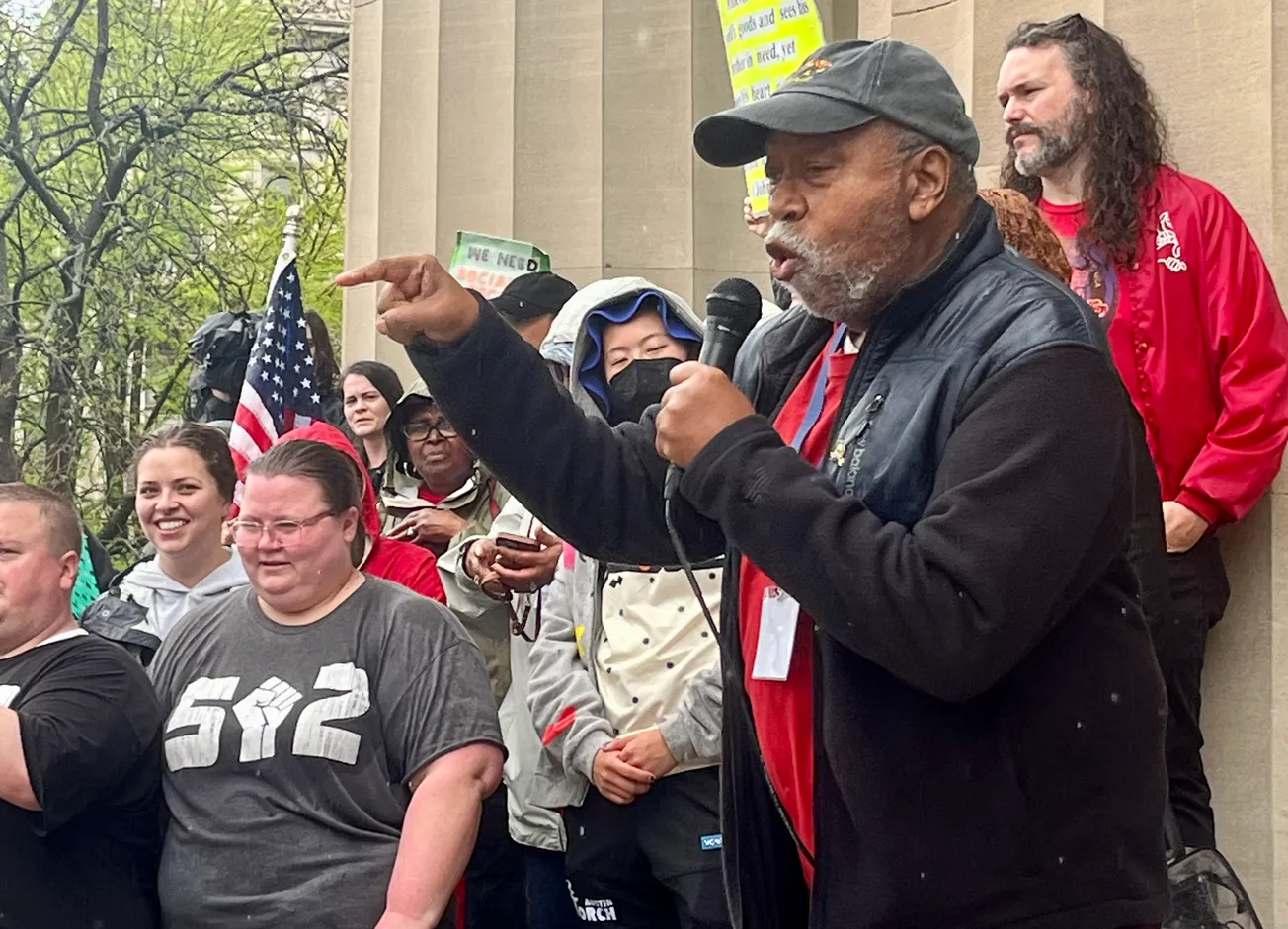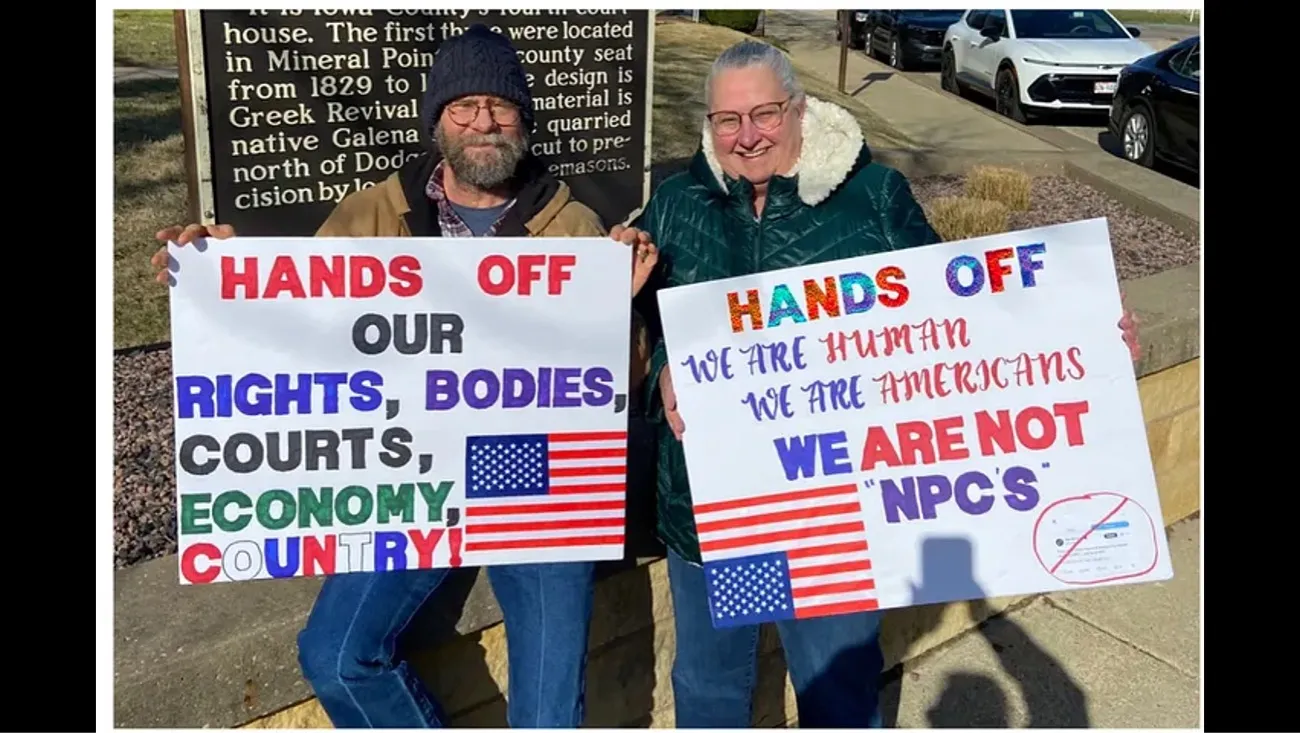Democratic Gov. Andy Beshear and Republican U.S. Sen. Mitch McConnell hailed a White House announcement Monday that Kentucky will receive almost $1.1 billion to expand broadband internet access.
The funding is part of $42.45 billion unveiled by the Biden administration to connect all Americans to high-speed broadband internet by the end of the decade.
The funds, which will be distributed as grants across U.S. states and territories, are allocated under the bipartisan infrastructure law, passed in 2021, but unveiled as the kick-off for the administration’s three-week tour highlighting infrastructure projects and private sector investment across the U.S.
Speaking at the White House, President Joe Biden likened the ambitious goal to FDR’s New Deal-era rural electrification program that brought the then-modern technology to farms and rural areas across the United States.
“What we’re doing is, as I said, not unlike what Franklin Delano Roosevelt did when he brought electricity to nearly every American home and farm in our nation. Today (Vice President) Kamala (Harris) and I are making an equally historic investment to connect everyone in America to high speed internet, and affordable high speed internet, by 2030,” Biden said.
“Because for today’s economy to work for everyone, internet access is just as important as electricity was, or water or other basic services,” Biden continued.
Twenty-four million people lack access to high-speed internet because networks do not reach their homes or because of affordability issues, according to the administration.
Kentucky reaction
Calling it “a historic day,” Beshear said the federal funding will help the state “connect every family, community and business to high-speed internet.”
“Never before have we seen this type of investment in high-speed internet, and with it comes new infrastructure, more good jobs for our families and a boost to our already booming economy,” said the governor who is seeking reelection this year.
McConnell, the U.S. Senate’s Republican leader, touted his role in leading the bipartisan Infrastructure Investment and Jobs Act (IIJA) to passage in Congress two years ago.
A release from McConnell’s office said the measure “will give Kentucky billions of federal dollars over five years to improve the Commonwealth’s roads, bridges, railroads, riverports, airports, broadband, and more.”
“In today’s digital age, it’s essential that Kentucky’s communities, from rural towns to urban centers, have access to reliable and affordable high-speed Internet. Today’s federal funding will deploy internet infrastructure to communities across the Commonwealth that need it most, bringing new opportunity to millions of Kentuckians,” said McConnell. “The Bipartisan Infrastructure Law continues to deliver more wins for the people of Kentucky, and I’m delighted to see this significant investment head our way today.”
With the just-announced allocations, Kentucky will have received more than $1.6 billion in total high-speed internet funding since the American Rescue Plan Act was passed in March 2021, said Beshear.
The Broadband Equity, Access, and Deployment (BEAD) program, created through the 2021 law, is a program of the National Telecommunications and Information Administration that will fund additional expansion of high-speed internet networks in Kentucky, said Beshear’s office.
The program prioritizes projects that serve areas lacking internet speeds above 25/3Mbps. According to the most recent data released last month by the Federal Communications Commission, Kentucky has more than 258,000 unserved locations.
The Office of Broadband Development will administer a competitive grant process to distribute these funds, including to internet service providers and local governments, beginning in early 2024.
“We are prepared to hit the ground running after this historic announcement,” said Meghan Sandfoss, executive director of Kentucky’s Office of Broadband Development. “Combined with the Governor’s previous record-breaking investments to expand access, these new funds are going to drive substantial growth in the reliability and availability of high-speed internet.”
Beshear encouraged Kentuckians to take the Broadband Speed Test and sign up for the Affordable Connectivity Program if they are eligible.
The White House event
Harris opened the event in the East Room, attended by guests and members of Congress, with a description of her visit to Sunset, Louisiana, where she said 40 percent of households do not have broadband access.
“In Sunset, I met with parents who cannot apply for remote-work jobs because they do not have a high-speed internet connection at home,” Harris said. “… I met with entrepreneurs who struggle to start or grow a small business because they cannot get online. And I met with students who, when public buildings were closed during the pandemic, had to sit in the parking lot of a local library just to submit their homework over Wi-Fi.”
Jeff Say, manager of community engagement for UVA Health Culpeper Medical Center and a resident of Culpeper County, Virginia, told the crowd that the local internet service provider’s broadband connectivity stops a half mile from his home.
“What we ended up with was a hotspot that’s spotty at best and an ongoing struggle to work our schedule around the lack of connectivity,” Say said after Harris spoke and before he introduced Biden.
“We have to drive our children into my work, to my wife’s school, or to our county library to finish projects or homework assignments. Every aspect of our daily life has now seemingly been touched by internet access — education, health, commerce, and entertainment,” he continued.
‘Bidenomics’ touted
Connecting Americans to high-speed internet is a “key part” of “Bidenomics” — Biden’s plan that “is rooted in the simple idea that we need to grow the economy from the middle out and the bottom up—not the top down,” according to a memo the administration released Monday.
During his remarks on broadband funding, Biden highlighted recent employment numbers and big-ticket private investment in areas like semiconductor manufacturing — a nod to the CHIPS and Science Act he signed into law in 2022 that provided subsidies for the industry — as proof of his administration’s recent economic success.
The latest round of broadband grants builds upon the Affordable Connectivity Program that provided income-eligible families at least a $30 discount per month on internet service as a part of the American Rescue Plan, both Biden and Harris noted.
Dubbed the “Internet for All” initiative, Monday’s announcement begins the near-month-long tour by Biden and administration officials to spotlight some of the 35,000 projects either funded or underway since Biden took office.
Biden is running for re-election in 2024.
The money will first be prioritized to install and upgrade broadband networks, according to the White House. Once those goals are met, remaining funds can be used for “access-, adoption- and equity-related uses.”
The Department of Commerce’s National Telecommunications and Information Administration will administer the grants to all 50 states, as well as the District of Columbia and five U.S. territories. The funding comes from the Broadband Equity, Access and Deployment program established under the Infrastructure Investment and Jobs Act.
States and territories are expected to receive a formal notice of allocated funds by June 30.
States, internet providers, tribal governments and community organizations will then have 180 days to submit grant proposals. The various grants are detailed at InternetForAll.gov.
--30--
Cross-posted from the Kentucky Lantern.








